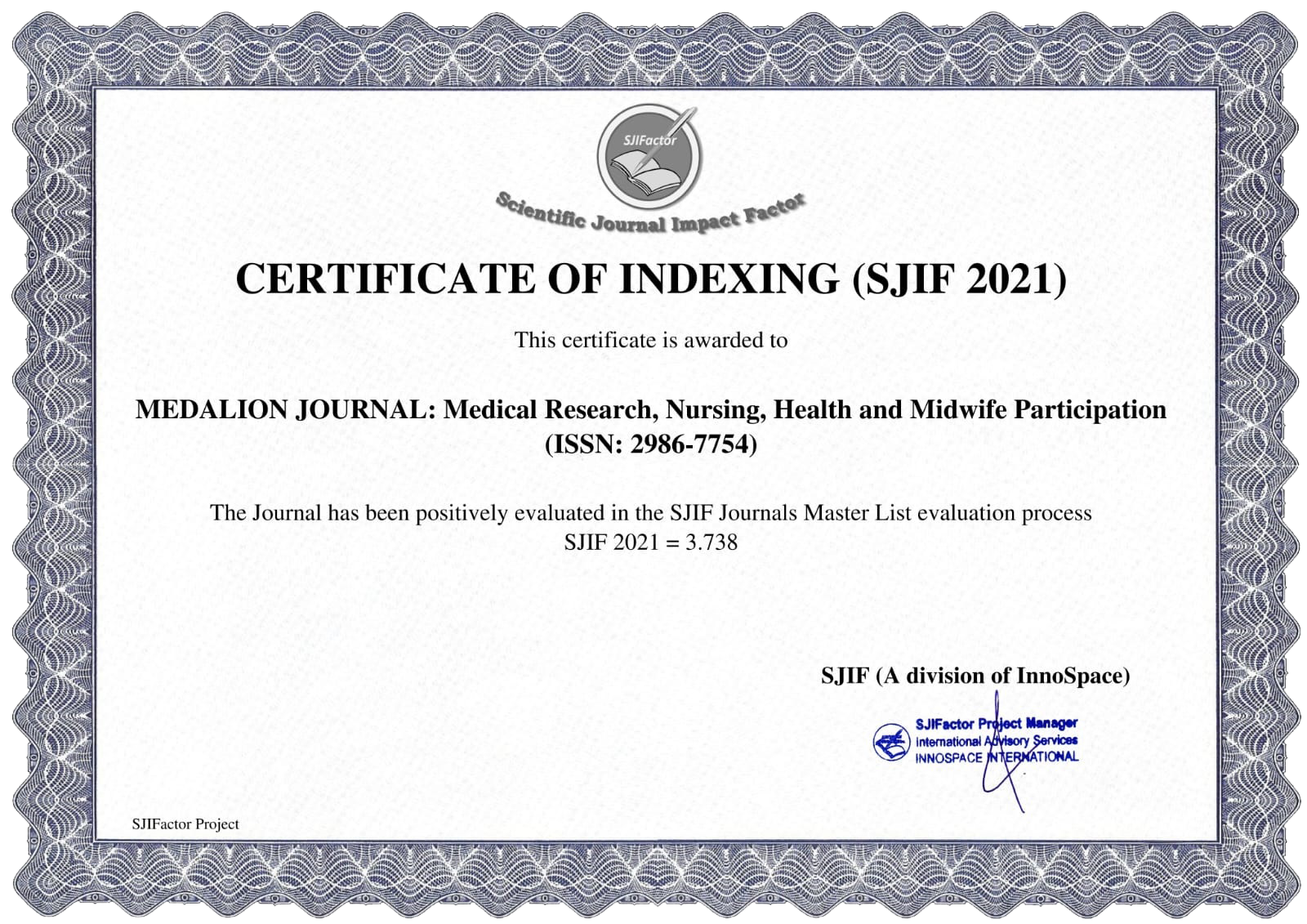The Effectiveness of a Pocket Book as an Educational Medium in Increasing Knowledge of Diabetes Mellitus Prevention Among Students of SMAN 1 Meulaboh, West Aceh Regency
Main Article Content
Zilvia Zuhra
Lili Eky Nursia N
Meutia Paradiba
Fikri Faidul Jihad
Mardi Fadillah
Background: The World Health Organization (WHO) reported in 2021 that 537 million (10.5%) adults (20-79 years old) had diabetes. In 2024, in West Aceh Regency, Johan Pahlawan District, 748 cases of Diabetes Mellitus were found. Diabetes Mellitus is a non communicable disease whose prevalence is increasing, including in the adolescent age group. Adolescents are a group that is vulnerable to lifestyle changes that can increase the risk of developing Diabetes Mellitus. Therefore, education about the prevention and management of Diabetes Mellitus in adolescents is very important to be carried out from an early age. This research has high urgency in the context of public health, especially in the prevention and management of Diabetes Mellitus in adolescents, because it can provide effective solutions through pocket books as a simple, concise, and easy to carry educational medium. Objective: Research to determine the effectiveness of pocket books as educational media in increasing adolescent knowledge about Diabetes Mellitus. Methods: This study used a pre-experimental design with a one-group pre-test and post-test approach. The population consisted of 38 students in 10 th grade. The sample size was 38 students, selected using purposive sampling technique with criteria of age 14-15 years. The research instrument was a validated questionnaire on knowledge about Diabetes Mellitus. Data analysis was performed using paired sample t-test with a significance level 0f 0.05. Results: The mean difference in scores was -30,395 with a standard deviation of 8,086. The 95% confidence interval ranged from -33,052 to -27,737. The t-test value obtained was -23.172, and the significance value was 0.000 (p<0.05). This indicates that there is a significant difference between the pretest and post-test scores. And the N-gaiin test had a mean value of 0.7692 > 0,7 which means the effectiveness is high, and the N-gain percentage showed a mean value of 76.9236 or 77.1%, indicating that it is effective. Conclusion: Education through pocket books has been proven effective in improving adolescents knowledge about diabetes melitus, making it a practical and easily understandable alternative medium for health promotion.
Afandi, A., & Siregar, N. S. (2020). The effectiveness of a nutrition pocket book on improving the knowledge of Unimed Athletic Club (UAC) athletes. Journal of Health and Sports, 4(2), 12. https://doi.org/10.24114/ko.v4i2.22168
Ahmad, A. (2019). The effectiveness of a nutrition pocket book on improving the knowledge of Unimed Athletic Club (UAC) athletes.
Alpian, M. (2022). Type 2 Diabetes Mellitus and its treatment: A literature review. Journal of Public Health and Medical Studies, 1(1), 13–23.
Andriani, W. R., & Hasanah, D. R. N. (2023). Instability of blood glucose levels in type 2 diabetes mellitus (T2DM) patients. Tirtayasa Medical Journal, 2(2), 77. https://doi.org/10.52742/tmj.v2i2.19529
Atika, N. (2022). Development of an interactive electronic pocket book for social studies in blended learning to improve students’ cognitive learning achievement in grade IV of SDN Tugu 2 (Doctoral dissertation, Sultan Agung Islamic University).
Azhari, R. (2018). Family support and self-management behavior among type II diabetes mellitus patients at Simpang IV Sipin Health Center, Jambi City. Health Information Research, 7(1), 76. https://doi.org/10.30644/rik.v7i1.135
Burkon, L. K., Nafisah, N., Kuncoro, P. T., & Arini, D. (2023, October). Effectiveness of pocket books as educational media in improving dietary knowledge and adherence among type 2 diabetes mellitus patients in Sumbang District, Banyumas. In Proceedings of the National Seminar of LPPM UNSOED (Vol. 13, pp. 204–212).
Aceh Barat District Health Office. (2024). Public Health Annual Report of Aceh Barat District for 2023. Meulaboh: Aceh Barat District Health Office.
Hidayah, M., & Sopiyandi. (2018). Effectiveness of using educational media in the form of pocket books and leaflets on knowledge and dietary compliance among outpatients with type 2 diabetes mellitus at the community health center. Pontianak Nutrition Journal (PNJ), 1(2). http://ejournal.poltekkes-pontianak.ac.id/index.php/PNJ
International Diabetes Federation. (2021). IDF Diabetes Atlas (10th ed.). Brussels, Belgium: International Diabetes Federation. https://diabetesatlas.org
Ikbal, A. (2016). Development of a pocket book on limit theme 6 for grade 6 students to increase awareness of health during the COVID-19 pandemic. Mataram, 4(1), 1–2.
Irianto, K. (2014). Epidemiology of communicable and non-communicable diseases: A clinical guide. Bandung: Alfabeta, pp. 61–96.
Ministry of Health of the Republic of Indonesia. (2023). Indonesia Health Statistics (IHS) 2023. Jakarta: Ministry of Health of the Republic of Indonesia.
Purnama Simangunsong, D., Sihaloho, L., Sitanggang, R., & Simanjuntak, R. (2024). Understanding adolescent development with sensitivity toward mental health. Journal of Religion, Social, and Cultural Studies, 3(3). https://publisherqu.com/index.php/Al-Furqan
PERKENI. (2015). Consensus on the management and prevention of type 2 diabetes mellitus in Indonesia. Jakarta: The Indonesian Society of Endocrinology (PERKENI).
Sari, P. (2019). Analysis of Edgar Dale’s cone of experience and the diversity of learning styles in selecting appropriate media for learning. Mudir: Journal of Educational Management, 1(1), 58–78.
World Health Organization. (2022). Diabetes. World Health Organization. https://www.who.int/news-room/fact-sheets/detail/diabetes
Yeni, Y. M. (2022). Development of a digital pocket book learning media on Plantae material as a learning resource for grade X MAN students (Doctoral dissertation, IAIN Metro).
Ziya, K. (2024). Effectiveness of using e-books among students of SMA Negeri 5 Banda Aceh (Doctoral dissertation, UIN Ar-Raniry, Faculty of Adab and Humanities).





